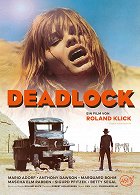Réalisation:
Roland KlickScénario:
Roland KlickPhotographie:
Robert van AckerenMusique:
CanActeurs·trices:
Mario Adorf, Anthony Dawson, Marquard Bohm, Mascha Rabben, Siegurd Fitzek, Arnold MarquisRésumés(1)
A film stripped to the bone. In a ghostly post-apocalyptic landscape, this abstract neo-western − among whose fans are Alejandro Jodorowsky, Quentin Tarantino and Steven Spielberg − unravels a deliriously warped and chillingly essential variation on a classic plot: three thugs fight over a suitcase full of money. (Summer Film School)
Critiques (1)
Roland Klick’s second feature film can be described as a modern minimalist paraphrase of Leone's The Good, the Bad and the Ugly (1966). The narrative also revolves around a trio of goons on a hunt for treasure. Instead of the opulent spectacle of the master of spaghetti westerns, however, Klick gnaws the premise and all of the genre attributes down to the marrow. As the suitcase full of money successively changes hands, the dynamics of the relationships between the individual characters and, primarily, the tension between the roles they outwardly play and their inner personalities begin to emerge. After all, though the characters do not deny their affinity for western archetypes (the sheriff, the mysterious stranger, the sinister brute, the ill-fated girl and the fallen woman), in Klick’s deranged interpretation they come across more as people maliciously trapped in a timeless genre amusement park in the form of a desolate one-horse town in the middle of the desert, from which there is no escape and where the aesthetics of Wild West towns blend with post-apocalyptic decay. Filming took place in the adventurous spirit that is typical of Klick, in the no-man’s land between Israel and Jordan after the Six-Day War, and Klick stated that the border tensions at the location contributed to the film’s overall atmosphere. The music was composed by the German experimental rock band Can, whose hypnotic tones further contribute to the phantasmagorical pop/art mood of the work. Deadlock was selected by the dramaturgs of the Cannes International Film Festival to represent Germany in the main competition. However, this decision caused resentment among the favourites and members of the “New German Cinema” movement, and the film was consequently screened in Cannes outside of the main programme (its place in the competition was taken by the now completely forgotten Malatesta [1970] by Peter Lilienthal). Despite this, Deadlock received an enthusiastic response at home upon its release in cinemas and subsequently won the German Film Award for Best Director. [written for the 2018 Summer Film School]
()

